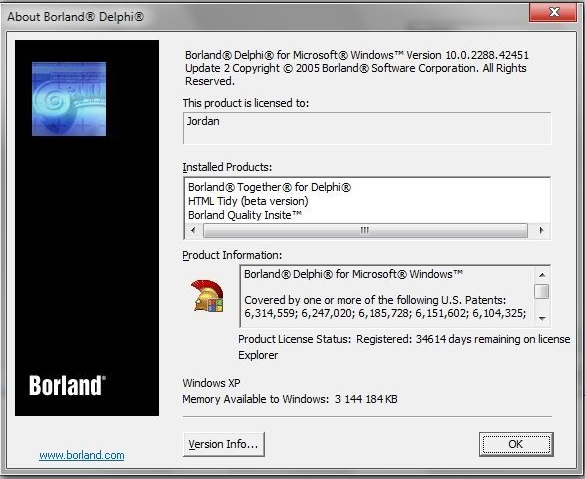Skachatj Delphi 7 Na Russkom Dlya Windows 7

Resource Hacker TM. A freeware resource compiler & decompiler for Windows® applications Version 5.1.7 Last updated: 3 January 2019 Copyright © 1999-2019 Angus Johnson Freeware - no nags, no ads and fully functional.
Registered Delphi 7 users can now download the Delphi 7.1 update. Due to a Windows Help engine limitation on Windows 98 and Millennium, the Help.
Overview: Resource Hacker™ is a resource editor for 32bit and 64bit Windows® applications. It's both a resource compiler (for *.rc files), and a decompiler - enabling viewing and editing of resources in executables (*.exe; *.dll; *.scr; etc) and compiled resource libraries (*.res, *.mui).
While Resource Hacker™ is primarily a GUI application, it also provides many options for compiling and decompiling resources from the command-line. Compiling: Compiling can be initiated either by opening an existing resource script file, or by creating one from scratch using Resource Hacker's editor.
The risk of RRV acquisition is likely primarily local, given the large case burden of RRV throughout Australia and its short period of viremia in humans, as well as the fact that its main vertebrate hosts are believed to be non-migratory native macropods common to Australia, such as kangaroos and wallabies. Nonetheless, RRV is found in dozens of vector and mammal host species and, given its recent spread from Australia into the South Pacific as well as Australians’ increasing overseas travel patterns, the virus may continue to expand to other tropical regions. Workbook 7 naumova photos. For example, New Zealand has reported infrequent importations of RRV from Fiji. Hence, improved data collection on the region of acquisition and relevant data analysis should allow better capturing seasonality and geographic spread. Although RRV is endemic to Australia, there has been occasional epidemic activity in Papua New Guinea and the South Pacific, and importation into Australia from travelers to these regions is possible.

A complete list of Resource-Definition Statements can be found. Additional features of Resource Hacker's compiler include: The #INCLUDE directive (to access definition statements in header files etc) can be nested to multiple levels, as can the #IF, and #IFDEF directives. #DEFINE, #UNDEF, #IF, #ELIF, #ELSE, #IFDEF, #IFNDEF, #INCLUDE, and #PRAGMA directives are all supported. Strings, between double-quote (') characters, may contain typical 'C' style backslashed 'escaped' characters — t, n,, ', x, u and 377 (octal). A double-quote within a string must be 'escaped' using either a preceding backslash or with another double-quote. Script comments are preceded either by double forward-slashes (//) or by a semi-colon (;). Filenames with relative paths are allowed.
Filenames that contain spaces must be enclosed within double-quote characters. Compiler error messages are reported, even errors nested within INCLUDE statements. Viewing and Editing Resources: Once a resource file has been opened, its resources will generally be displayed as either an image (or group of images) or as decompiled text. Binary resources, usually images, can't be edited directly with Resource Hacker, but they can still be very easily exported and imported once they've been modified by an external image editor. (I see no benefit in duplicating what third-party image editors do so well.) Menu and Dialog resource types have their own WYSIWYG designers: Binary resources that have unknown formats will be displayed as read-only binary text. (Any resource can also be viewed in this fashion if desired.) Other Actions: Command Line Syntax: Just about all the functionality of Resource Hacker™ can be accessed from the command line without having to open the Resource Hacker™ GUI.
Command line instructions and Resource Hacker™ scripts can remove the drudgery entailed with repeating Resource Hacker™ tasks. Command-line instructions are a combination of switch statements followed by switch parameters as explained in the following table: Command line statements: Switch Parameter -open filename - the name of the file that is to be modified.